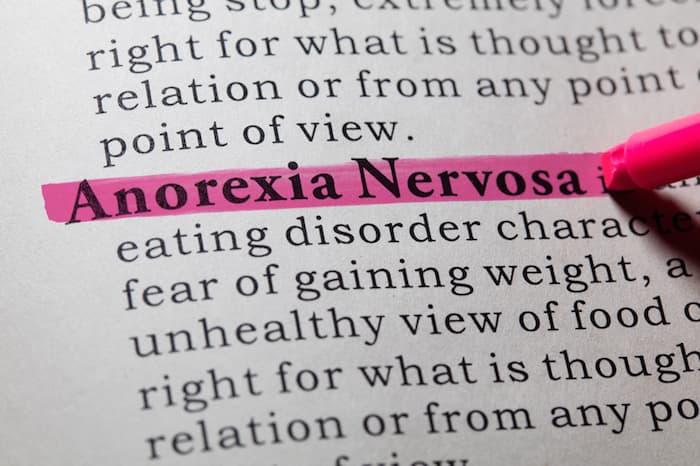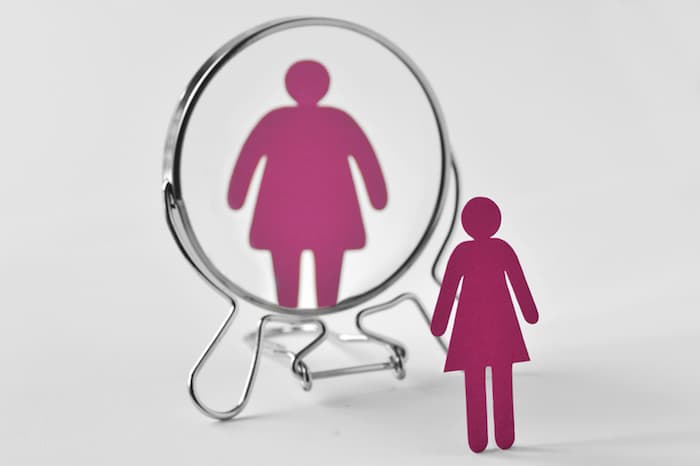How Do You Know if You Have Anorexia?
Anorexia Nervosa is a serious eating disorder that is treatable but can be life-threatening without intervention. With over 200,000 individuals in the Usa impacted per year and the highest bloodshed rate of any mental illness, it is of import to learn the signs, symptoms, and treatment options for this disorder.
Anorexia Medical Definition
Anorexia Nervosa is characterized by the National Institute of Mental Illness every bit individuals that have "a pregnant and persistent reduction in food intake leading to extremely low trunk weight; a relentless pursuit of thinness; a distortion of torso image and intense fright of gaining weight; and extremely disturbed eating behavior [1]."
Anorexia Definition According to the DSM-5
The Diagnostic & Statistical Manual of Mental Illness (Fifth Edition) specifies that the post-obit diagnostic criteria must exist met for an private to exist diagnosed with Anorexia Nervosa:
- Restriction of energy intake relative to requirements, leading to significantly low torso weight in the context of age, sexual practice, developmental trajectory, and physical health,
- Intense fear of gaining weight or of becoming fat, or persistent behavior that interferes with weight gain, even though at a significantly low weight,
- Disturbance in the way in which one'due south body weight or shape is experienced, undue influence of body weight or shape is experienced, undue influence of body weight or shape on self-evaluation, or persistent lack of recognition of the seriousness of the current low body weight [two].

ICD-10 Code for Anorexia Nervosa
The DSM-5 is a diagnostic resource created by the American Psychiatric Association and but used for diagnosis in the United states. The ICD-10, or International Classification of Disease, is a globally used diagnostic tool designated past the Earth Health Arrangement. These codes assistance medical and mental wellness professionals worldwide communicate a diagnosis regardless of the term used past that land or culture.
The ICD-10 diagnosis for Anorexia Nervosa is F50.0, and there are specifier codes for subtypes, with F50.01 signifying Anorexia Nervosa, Restricting Type, and F50.02 signifying Anorexia Nervosa, Binge-Purge Type (each defined below).
Related Reading
- Bulimia Nervosa
- Rampage Eating Disorder
- What Are Eating Disorders?
Dieting Vs. AN
Though the restrictive eating patterns that narrate this anorexic eating disorder are similar to dieting behaviors, there are stark differences between the ii. The furnishings of the extreme behaviors resulting from this disease are far more than devastating and consequential than any ill effects from dieting.
While someone may diet in an attempt to control weight, anorexia nervosa is ofttimes an attempt to gain control over 1's life and emotions, specially in the light of traumatic events or a chaotic environment.
While someone might diet in an attempt to lose weight as the primary goal, in anorexia they may nutrition because they perceive losing weight as a fashion to attain happiness and cocky-mastery.
Anorexia Facts & Statistics
The first reports of deprivation of physical needs through food go back to 300 BC, and in that location are many examples of these behaviors surfacing throughout history. Outside of these circumstances, Anorexia Nervosa was non officially designated as a mental health diagnosis until the DSM-3 was published in 1952. Since then, the disorder has taken on new iterations, and research has learned a neat deal more about its affect.
- Approximately 200,000 individuals in the US struggle with anorexia.
- 1 in 200 women suffers from anorexia [3].
- Anorexia typically begins presenting during boyhood or young adulthood [2].
- Anorexia is the 3rd most common chronic affliction in adolescents [3].
- Anorexia is less prevalent in males than females, with an approximate ratio of 10 females to one males suffering [2].
- Nigh individuals struggling with anorexia experience "remission" inside 5 years of presentation of the affliction if properly treated [2].
- 20% of individuals with an anorexia diagnosis volition die [iii].
- The bloodshed rate for anorexia is "12 times higher than the death rate of ALL causes of death for females 15 – 24 years old [3]."
- Death from anorexia nervosa most commonly occurs due to "medical complications associated with the disorder itself or from suicide [2]."

Types of Anorexia
Due to the complexities of disordered eating behaviors and the fact that individuals do non always engage in restricting behaviors alone, the DSM-five has designated singled-out subtypes to further empathize anorexia behaviors.
Anorexia Nervosa, Restricting Type
Restricting Type is the subtype of anorexia most usually known. Individuals diagnosed with Restricting Type cannot have engaged in episodes of rampage eating or purging within three months of diagnosis, and their "present with "weight loss is accomplished primarily through dieting, fasting, and excessive do [2]."
Anorexia Nervosa, Rampage-Eating & Purge Type
Those diagnosed with Anorexia Nervosa, Rampage-Eating/Purging Type are those that engage in restrictive behaviors every bit well binge eating and compensatory purging behaviors such as cocky-induced airsickness or misuse of laxatives, diuretics, or enemas [ii]. This subtype differs from a Bulimia Nervosa diagnosis in that those struggling with Bulimia Nervosa exercise not engage in any restrictive behaviors.
Atypical Anorexia Nervosa
Singular Anorexia Nervosa falls under the DSM-5 category of "Other Specified Feeding or Eating Disorder," which describes presentations in which symptoms feature of a feeding and eating disorder are present and cause clinically significant distress just do not meet full criteria of a specific diagnosis [2]. Atypical Anorexia Nervosa differs from anorexia in that the individuals meet all criteria for anorexia except that, "despite significant weight loss, the private's weight is within or bone the normal range [ii]."
Anorexia Athletica
"Anorexia Athletica," likewise known every bit "sports anorexia" or "practice anorexia," is not a formal DSM-5 diagnosis. However, it is a phenomenon that is existence more widely debated, as many eating disorder researchers and professionals believe its prevalence warrants an official diagnosis. Until then, the term refers to individuals that engage in excessive or compulsive practice and exercise not consume the calories necessary for nourishment.

Anorexia Nervosa Symptoms
Our social club has a warped perception that one must announced emaciated to struggle with anorexia. The truth is, you lot cannot tell by looking at someone whether or not they engage in anorexic behaviors; nonetheless, some alarm signs can signal a possible problem.
Physical Side Furnishings of Anorexia
Anorexia Nervosa results in severe malnourishment that can be identifiable in many means other than weight loss, such every bit:
- Loss/fluctuation of trunk fat and muscle.
- Yellowing and dry skin.
- Growing fine pilus all over the body (lanugo).
- Loss or irregularity in the menstrual cycle (amenorrhea).
- Constipation.
- Intestinal hurting and gastrointestinal issues.
- Reduced immune system.
- Difficulty regulating temperature or tolerating the cold.
- Lethargy and low energy.
- Dental erosion.
Behavioral & Emotional Signs of Anorexia
Individuals that struggle with anorexia will display specific behavioral and emotional warning signs that indicate a lack of nourishment and mental distress. I of these include:
- Reporting an intense fear of weight gain or becoming fat.
- Emphasis on trunk weight, size, shape, and advent that causes apparent distress.
- Hyperfocused on nutrient, including nutritional content, bodily impact, and
- Ritualistic eating patterns such as small/big bites, pushing food around, eating in groups, fugitive certain foods, belongings food in cheeks, etc.
- Distorted torso image.
- Exercising excessively, fifty-fifty when weather is bad, interferes with job/schoolhouse/socializing, or injury occurs.
- Refusing to eat or exist seen eating by others and avoiding eating in social situations.
- A pattern of declining to eat, possibly stating that they have "already eaten" and/or "aren't hungry."
- Mood swings and increased emotion dysregulation.
- Difficulty thinking conspicuously and focusing.
Long-Term Anorexia Complications
The frightening truth is that untreated anorexia nervosa tin exist lethal, regardless of age, sexual practice/gender, ethnicity, organized religion, socioeconomic status, etc. Although our civilization is recognizing gender as less blackness-and-white than binary gender identification, most inquiry is conducted based on the constructs of male person and female, therefore, the touch of long-term anorexia nervosa behaviors will be summarized based on these two genders below.
Female
1 in 200 women struggle with anorexia nervosa and, if left untreated, can experience long-term consequences such equally:
- Loss of menstrual cycle, difficulty conceiving, & possible infertility.
- Damage to the vital organs could result in life-threatening issues.
- Cardiovascular complications & increased take chances of middle failure.
- Bone and muscle loss.
- Severe impact on career and human relationship performance.
- Increased symptoms of other mental illnesses such as low, anxiety, and substance apply.
- Death. A study completed by the National Clan of Anorexia Nervosa and Associated Disorders found that 5 – 10% of individuals struggling will die within ten years later the onset of the disorder [three]. These statistics vary based on gender identification.
Male
The statistical understanding that men experience eating disorders less than women may not be entirely accurate, as men are less probable to discuss their struggles openly. 15% of those struggling with anorexia nervosa identify every bit male. Long-term consequences of anorexia in men include:
- Harm to the vital organs could issue in life-threatening failures to function.
- Cardiovascular complications & increase run a risk of center failure.
- Bone and muscle loss.
- Severe impact on career and relationship functioning.
- Increased symptoms of other mental illnesses such as depression, anxiety, and substance utilize.
- Death. Men with eating disorder diagnoses are at an increased run a risk of dying every bit they are often diagnosed subsequently in their disorder due to assumptions that men do not struggle with disordered eating [4].

Causes of Anorexia
Reducing anorexia nervosa onset to one specific cause is impossible; nevertheless, there are various factors that can betoken increased risk.
Biological Factors
Research is working to place specific factor variants related to anorexia nervosa development. Beyond this, information technology is clear that individuals born with predispositions for perfectionism, rigidity, and sensitivity are more likely to struggle with anorexia. These individuals often utilize these traits to foster unsafe restrictive dieting, eating, and exercise behaviors—Additionally, individuals with a first-degree relative that struggled with anorexia nervosa are more likely to develop it.
Psychological Factors
Individuals with previous mental health diagnoses are more than likely to develop eating disorders in general. Each eating disorder diagnosis has unique relationships with co-occurring diagnoses. Anorexia is usually seen to co-occur with anxiety disorders equally well as obsessive-compulsive disorders, every bit the traits of perfectionism and rigidity mentioned in a higher place are mutual in all of these disorders and fuel anorexia tendencies.
Ecology Factors
Eurocentric beauty ideals that emphasize perfection and thinness play an important function in anorexia development. Individuals are also more than probable to develop anorexia if their family dynamics and beliefs discussed in their upbringing emphasize values, appearance, and food and practise relationships that are similar to Western beauty and diet civilization ideals.
How to Treat Anorexia
It is of import that anorexia be treated once warning signs are recognized, equally studies bespeak that the earlier intervention occurs, the improve long-term recovery outcomes are. Equally the age of onset is in adolescence and young adulthood, anyone interacting with this population should be vigilant to the warning signs and not afraid to have consequent discussions around appropriate relationships with nutrient, exercise, and the trunk.
Once anorexia has been developed or diagnosed, receiving treatment from eating disorder professionals is important. These individuals sympathise the nuances of the disorder and tin can back up the individual and their loved ones in recognizing the level of intendance needed and determining how the individual can access this support. Consider searching online for reputable eating disorder professionals on trusted sites or reaching out to the insurance company that will be providing coverage to learn who they comprehend.
As with almost eating disorders, the almost effective methods of treatment for anorexia nervosa are Cognitive Behavioral Therapy, DBT, and Family-Based therapy. Consider asking handling centers what modality they use to treat anorexia earlier choosing where to receive treatment.
Anorexia tin be a harrowing disorder, but information technology is of import to recall that it is treatable. An private can struggle yet receive appropriate handling and alive a life free from food rules, dieting, and restriction and, instead, focused on fulfillment, joy, and recovery.
References
[1] Unknown (2017). Eating disorders. National Institute of Mental Health. Retrieved from https://www.nimh.nih.gov/wellness/statistics/eating-disorders#part_155057.
[ii] American Psychiatric Association. (2013). Diagnostic and statistical manual of mental disorders (5th ed.).
[three] Unknown (2006). Eating disorder statistics. S Carolina Section of Mental Wellness. Retrieved from https://www.state.sc.us/dmh/anorexia/statistics.htm.
[4] Mond, J.K., Mitchison, D., & Hay, P. (2014) Prevalence and implications of eating disordered behavior in men. Current Findings on Males with Eating Disorders. Philadelphia, PA: Routledge
Author: Margot Rittenhouse, MS, LPC, NCC
Page Reviewed Past: Jacquelyn Ekern, MS, LPC on June 14, 2021
Manufactures on Anorexia
- How Unsafe Are the Long-Term Effects of Anorexia?
Anorexia Nervosa has the highest mortality rate of any mental health issue. The physical dangers of starvation and consequences of declining mental and physical health are numerous. Learn more about the debilitating wellness consequences of anorexia nervosa… Read This Article - Singular Anorexia Nervosa: Signs and Symptoms
Atypical anorexia nervosa is featured in the Diagnostic & Statics Manual, Edition five (DSM-five) category of Other Specified Feeding or Eating Disorders (OFSED). Frighteningly, many individuals who take Singular Anorexia do non believe they have an eating disorder and are less probable to seek the life-saving handling they need. Acquire near the dangers and concerns of Atypical Anorexia Nervosa… Read This Article - Anorexia Recovery and Overcoming Physical Side Furnishings of an Eating Disorder
A highly regarded physician specializing in treating acute eating disorders outlines the health consequences of Anorexia Nervosa and the challenges faced in recovering from this life-threatening eating disorder. Learn nearly electrolyte imbalances, dehydration, edema and other concrete consequences of anorexia nervosa… Read This Article - Anorexia Nervosa – Highest Mortality Rate of Any Mental Disorder: Why?
Many psychiatric disorders are dangerous, but when it comes to death, Anorexia holds the unfortunate leading cause of expiry in anyone with a psychiatric disorder. Issues related to refeeding syndrome, dumb encephalon function, and kidney failure all contribute to the potential of expiry from anorexia. Learn more about these life-threatening conditions experienced past males and females struggling with anorexia…Read This Article - Inspiration Stories of Anorexia Nervosa Recovery
Successful people outline their encouraging stories of overcoming disordered eating, extremely restrictive caloric consumption, over exercise other forms of unhealthy weight control methods. Find promise and proof that anorexia recovery happens and that y'all can recover from this eating disorder, too…Read This Article - How Malnourishment Affects the Brain: Research on Anorexia and Neurobiology
Many individuals who deal with anorexia nervosa are extremely vivid, talented and gifted. Still, the low trunk weight and lack of adequate caloric consumption can literally crusade the brain to compress. Cognitive impairment, emotional instability, and poor judgment often accompany anorexia nervosa…Read This Article - Anorexia and Amenorrhea: What are the Consequences?
Underweight women oft terminate menstruating and it can take long-term consequences on their health. In anorexia, the undereating, low weight and lack of nutritional needs beingness adequately met can lead to apropos health consequences such every bit orthopenia, orthorexia, and infertility struggles…Read This Article - Long-Term Effects of Anorexia Nervosa
Nether the societal pressure level to be thin, many people forgo their common sense knowledge about diet and wellness in gild to look thin and feel accepted. Sadly, some of these individuals end up in full-blown anorexia nervosa battles that threaten their health and wellbeing…Read This Article - Refeeding Patients with Anorexia Nervosa: What Does Inquiry Show?
It seems that weight gain and nutrient are the cure for anorexia, however, the process of regaining weight is fraught with danger. It is crucial to understand the dangers of refeeding someone in recovery from anorexia nervosa. Learn more most the health risks and best practices of increasing eating and weight gain in the treatment of anorexia…Read This Article - Anorexia and Friendship: How Exercise I Help My Friend?
How to offering love and support to a friend y'all are concerned may have Anorexia Nervosa. Tips are provided hither include respecting boundaries, communicating your worries most their low weight and/or restrictive eating, etc. This is one of the top questions posed to our squad at Eating Disorder Hope, learn at present how to best accost your concerns regarding anorexia nervosa and your loved one…Read This Article
© Copyright 2022 Eating Disorder Hope. All Rights Reserved. Sitemap. Privacy Policy. Terms of Use.
MEDICAL ADVICE DISCLAIMER: The service, and whatever information independent on the website or provided through the service, is provided for informational purposes merely. The data independent on or provided through this service is intended for general consumer agreement and didactics and non as a substitute for medical or psychological advice, diagnosis, or handling. All information provided on the website is presented as is without any warranty of any kind, and expressly excludes any warranty of merchantability or fitness for a item purpose.
Source: https://www.eatingdisorderhope.com/information/anorexia
0 Response to "How Do You Know if You Have Anorexia?"
Post a Comment